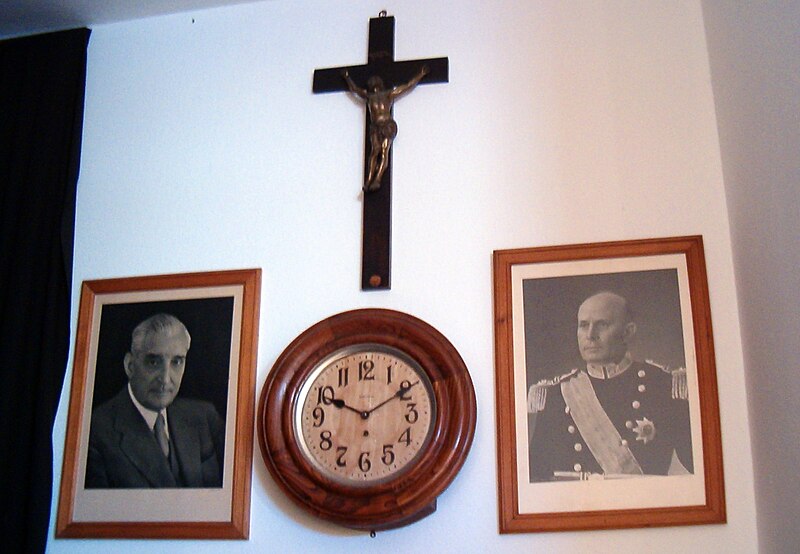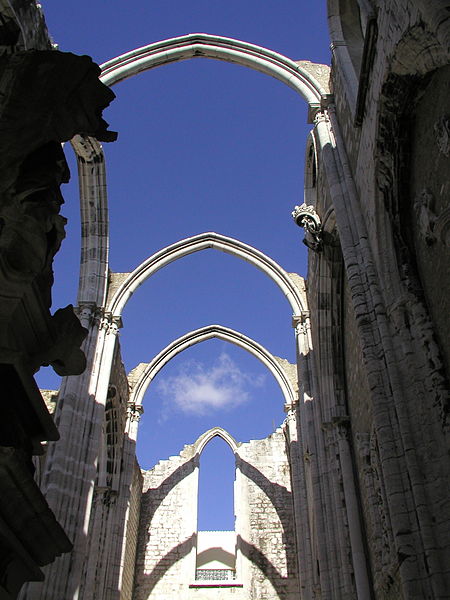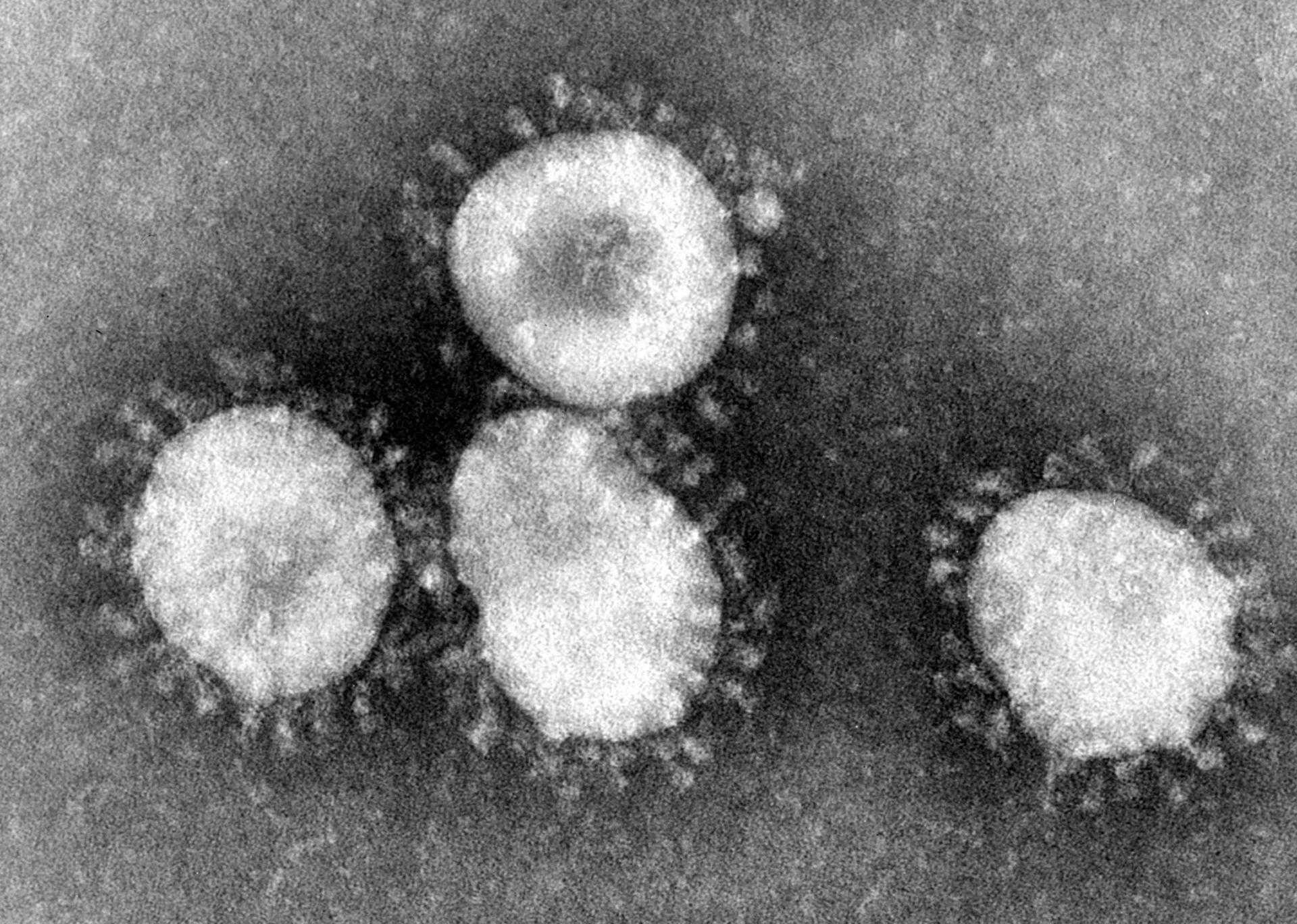 Continuing my study of Portuguese history prior to going to Lisbon at the end of this month, I was not at all surprised to discover the role of the Catholic Church in the establishment of the first European fascist dictatorship in Portugal in 1926.
Continuing my study of Portuguese history prior to going to Lisbon at the end of this month, I was not at all surprised to discover the role of the Catholic Church in the establishment of the first European fascist dictatorship in Portugal in 1926. I was not surprised because I was already aware of the role the Catholic Church played in Spain, Germany, Hungary and various Latin American right-wing dictatorships of the twentieth century and how it has almost invariably been on the side of anyone determined to restrict the rights of ordinary people and maintain conditions of superstitious ignorance, squalor and want for ordinary people.
But I didn't fully appreciate how close the Pope and his clerics were to the Portuguese fascists. In fact, the military coup of 1926, which put an end to the Portuguese First Republic established in 1910, was effectively a Catholic coup d'état. It was led by the odious and deeply repugnant António de Oliveira Salazar, a devout Catholic and college roommate of Manuel Gonçalves Cerejeira who later became Cardinal Patriarch of Lisbon. Salazar had himself been a Catholic seminarian before studying law.
 The Constitution Salazar imposed on the Portuguese was closely based on two Papal encyclicals, Rerum Novarum (1891) and Quadragesimo Anno (1931).
The Constitution Salazar imposed on the Portuguese was closely based on two Papal encyclicals, Rerum Novarum (1891) and Quadragesimo Anno (1931). In 1940, a Concordat governing Church-State relations was signed between Portugal and the Vatican. The Church was to be "separate" from the State but to enjoy a special position. The Concordat of 1940 reversed many of the anticlerical policies adopted during the First Republic, and the Catholic Church was given exclusive control over religious instruction in the public schools. Only Catholic clergy could serve as chaplains in the armed forces. Divorce, which had been legalized by the republic, was made illegal for those married in a Church service, but remained legal with respect to civil marriage. The Church was given formal "juridical personality," enabling it to incorporate and hold property.
Under Salazar, critics believe that Church and State in Portugal maintained a comfortable and mutually reinforcing relationship. While assisting the Church in many ways, however, Salazar insisted that it stay out of politics — unless it praised his regime. Dissent and criticism were forbidden; those clergy who stepped out of line — an occasional parish priest and once the Bishop of Porto — were silenced or forced to leave the country. The rest of the Roman Catholic Church hierarchy, led by Cardinal Manuel Gonçalves Cerejeira, a great friend and supporter of Salazar, remained silent on the issue.
During the dispute with the British when the white minority regime in Rhodesia led by Ian Smith unilaterally declared independence from Britain and tried to set up a South-African style apartheid system in Rhodesia (now Zimbabwe) Portugal had helped organise boycott-busting fuel supplies to Rhodesia through the Mozambique port of Beira. Portugal, apartheid South Africa and the British Conservative Party were about the only outside supporters of the white racists in Rhodesia.
As 'front-line' states, Portuguese Mozambique and Angola, which bordered South African-administered South-West Africa (now Namibia) had been solidly behind the racist South African apartheid regime - and all under the beatific and approving gaze of the Catholic Church in the form of Salazar's old college chum, Cardinal Cerejeira and the Pope.
The wars that ensued in the Portuguese colonies of Angola, Mozambique and Guinea were to have a major effect on Portugal's political development. In a curious twist of history, the African liberation forces led by educated intellectuals Agostinho Neto in Angola and Samora Machel in Mozambique civilised their colonial 'masters' by exposing the young Portuguese military officers sent to suppress them to political thinking they had been carefully insulated from in their native Portugal where 'politics' consisted of praising the very wonderful António de Oliveira Salazar and blaming everything on socialists and foreigners. Many of these officers became politically and class conscious for the first time and began asking questions about what they were doing in Africa, and more importantly, why Portugal was lagging behind the rest of Europe and why the people could have no say in their own futures.
 Salazar had a severe stroke in 1968 and was succeeded by the equally odious Marcello José das Neves Alves Caetano. Unable to contemplate even the thought of giving independence to the 'lesser races' on whose labour what little wealth Portugal had depended, Caetano continued to pour money (up to 40 percent of GDP) and troops into increasingly hopeless African counter-revolutionary campaigns until, in 1974, a military coup led by the young enlightened army officers who had been politicised by the African revolutionaries, Caetano and his fascist regime were overthrown in the 'Carnation Revolution'.
Salazar had a severe stroke in 1968 and was succeeded by the equally odious Marcello José das Neves Alves Caetano. Unable to contemplate even the thought of giving independence to the 'lesser races' on whose labour what little wealth Portugal had depended, Caetano continued to pour money (up to 40 percent of GDP) and troops into increasingly hopeless African counter-revolutionary campaigns until, in 1974, a military coup led by the young enlightened army officers who had been politicised by the African revolutionaries, Caetano and his fascist regime were overthrown in the 'Carnation Revolution'. In February 1974, Caetano determined to remove General António de Spínola in the face of increasing dissent by Spinola over the promotion of military officers and the direction of Portuguese colonial policy. At this point, several left-wing military officers who opposed the war formed a conspiracy — the Movimento das Forças Armadas (MFA, "Armed Forces Movement"), to overthrow the government by military coup. The MFA was headed by the majors Vitor Alves and Otelo Saraiva de Carvalho and captain Vasco Lourenço and joined by Salgueiro Maia. The movement was significantly aided by other officers in the Portuguese army who supported Spinola and democratic civil and military reform. Some observers have speculated that Costa Gomes actually led the revolution.
There were two secret signals in the military coup: first the airing (at 10:55 pm) by 'Emissores Associados de Lisboa' of the song E Depois do Adeus by Paulo de Carvalho, Portugal's entry in the 6 April 1974 Eurovision Song Contest, which alerted the rebel captains and soldiers to begin the coup. Next, on 25 April 1974 at 12:20 am, Rádio Renascença broadcast Grândola, Vila Morena, a song by Zeca Afonso, an influential folk and political musician-singer forbidden on Portuguese radio at the time. This was the signal that the MFA gave to take over strategic points of power in the country and "announced" that the revolution had started and nothing would stop it except "the possibility of a regime's repression".
Six hours later, the Caetano regime relented. Despite repeated appeals from the "captains of April" (of the MFA) on the radio warning the population to stay safe inside their homes, thousands of Portuguese took to the streets, mingling with the military insurgents and supporting them. One of the central points of those gathering was the Lisbon flower market, then richly stocked with carnations, which were in season. Some military insurgents would put these flowers in their gun-barrels, an image which was shown on television around the world. This would be the origin of the name of this "Carnation revolution". Although there were no mass demonstrations by the general population prior to the coup, spontaneous civilian involvement turned the military coup into an event with unexpected popular participation.
Caetano found refuge in the main Lisbon military police station at the Largo do Carmo. This building was surrounded by the MFA, which pressured him to cede power to General Spínola. Both Caetano (the prime minister) and Américo Tomás (the President) fled to Brazil. Caetano spent the rest of his life in Brazil, while Tomás returned to Portugal a few years later.
The revolution was closely watched from neighbouring Spain, where the government and opposition were planning for the succession of Francisco Franco, who died a year later, in 1975.
In a poignant echo of the revolutionary Maoist slogan that political power grows out of the barrel of a gun, Portuguese revolutionary political power grew from carnations in the barrels of guns. Only four people died in the Carnation Revolution, shot by secret police before they realised the game was up. The people had taken their country back.
Very quickly the Portuguese colonies were given independence, democratic elections were organised and Portugal joined most of the rest of Western Europe as a civilised, democratic country owned now by the Portuguese people and no longer by a small wealthy elite and a cabal of Catholic clerics doing everything and anything in their power to maintain their privilege and unelected, unaccountable power, in the Catholic tradition.
For neighbouring Spain too the writing was on the wall. Within a year, Spain's Catholic-backed fascist dictator, Franco was dead and soon a restored monarchy under Juan Carlos restored a democracy stolen from the Spanish people in 1936. In 1986 Portugal and Spain joined the European Union.
The brutal experiment in political Catholicism called fascism which began in Portugal and which was copied in Spain, Italy, Hungary and Germany where it cost tens of millions of young lives to extinguish, was effectively ended when Portuguese soldiers put red carnations symbolising socialism in their gun barrels and declared the Carnation Revolution.
Viva a democracia Português.













